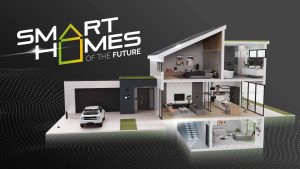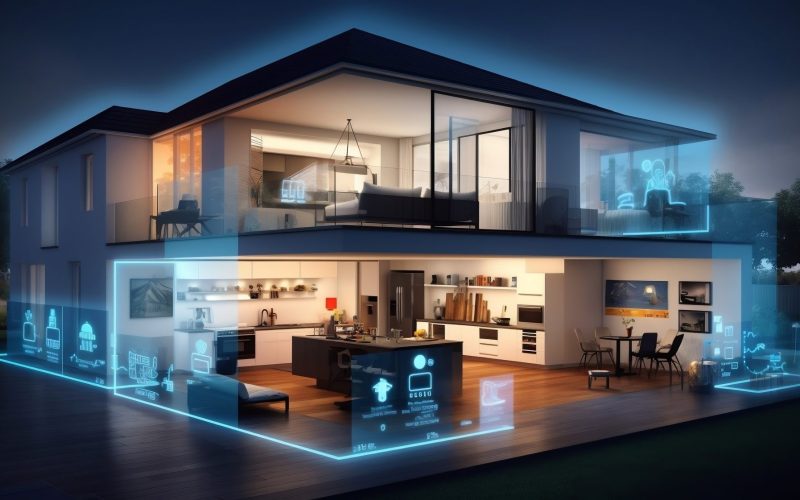The Future of Smart Home Technology
The advent of smart home technology has revolutionized the way we live, transforming our homes into automated, intelligent environments that cater to our needs and preferences. As technology continues to evolve, the future of smart home technology promises even greater advancements. This article explores the current trends, future prospects, challenges, and comparative aspects of smart home technology.

Current Trends in Smart Home Technology
Home Automation Systems
Home automation systems have become the backbone of smart homes, enabling the integration and control of various devices and appliances through a central hub. These systems offer convenience, energy efficiency, and enhanced security. Popular home automation platforms such as Amazon Alexa, Google Home, and Apple HomeKit allow users to control lighting, heating, and security systems with voice commands or mobile apps.
Smart Appliances
Smart appliances, including refrigerators, washing machines, and ovens, are equipped with sensors and connectivity features that enable remote monitoring and control. These appliances not only improve convenience but also contribute to energy efficiency by optimizing their operations based on usage patterns.
Internet of Things (IoT)
The Internet of Things (IoT) is a crucial component of smart home technology, connecting various devices and allowing them to communicate with each other. This interconnectivity enables seamless automation and control of home systems, leading to a more integrated and efficient living environment.
Future Prospects of Smart Home Technology
Artificial Intelligence and Machine Learning
Artificial intelligence (AI) and machine learning are set to play a pivotal role in the future of smart home technology. AI-powered systems can learn from user behavior and preferences, making homes more intuitive and responsive. For instance, AI can adjust lighting, temperature, and even suggest meal recipes based on past behavior and preferences.
Enhanced Connectivity with 5G
The rollout of 5G technology will significantly enhance the connectivity and performance of smart home devices. With faster data transfer speeds and reduced latency, 5G will enable more reliable and responsive home automation systems. This will facilitate the development of more advanced and sophisticated smart home applications.
Increased Focus on Sustainability
As environmental concerns continue to rise, the future of smart home technology will see a greater emphasis on sustainability. Smart homes will incorporate energy-efficient systems, renewable energy sources, and smart grids to reduce carbon footprints. Technologies like smart thermostats, energy-efficient lighting, and solar panels will become more prevalent.
Challenges Facing Smart Home Technology
Security and Privacy Concerns
One of the primary challenges of smart home technology is ensuring the security and privacy of users. With the increasing number of connected devices, the risk of cyberattacks and data breaches also rises. Manufacturers and developers must prioritize robust security measures and data protection to safeguard users’ personal information.
Interoperability Issues
The lack of standardization and interoperability among different smart home devices and platforms is another significant challenge. Users often face difficulties in integrating devices from different manufacturers, leading to fragmented systems. The industry needs to establish common standards and protocols to ensure seamless compatibility and interoperability.
Cost and Accessibility
While smart home technology offers numerous benefits, the high cost of devices and installation can be a barrier for many consumers. Additionally, the complexity of setting up and managing smart home systems can be daunting for non-tech-savvy individuals. Making smart home technology more affordable and user-friendly is crucial for widespread adoption.
Comparative Analysis of Smart Home Platforms
| Feature | Amazon Alexa | Google Home | Apple HomeKit |
| Voice Control | Yes | Yes | Yes |
| Compatibility | Wide range of devices | Wide range of devices | Limited to Apple ecosystem |
| Security Features | Good (supports two-factor authentication) | Good (supports two-factor authentication) | Excellent (strong encryption, two-factor authentication) |
| User Interface | Intuitive, voice and app control | Intuitive, voice and app control | Seamless integration with iOS devices |
| Customization | High | High | Medium |
| Price | Affordable | Affordable | Expensive |
Analysis Table: Current and Future Smart Home Technologies
| Technology | Current State | Future Prospects |
| Home Automation Systems | Centralized control, voice-activated | AI-driven automation, personalized settings |
| Smart Appliances | Remote monitoring, basic automation | Advanced AI features, greater energy efficiency |
| IoT | Device interconnectivity, data sharing | Enhanced connectivity with 5G, more seamless integration |
| AI and Machine Learning | Basic learning algorithms | Advanced predictive capabilities, deeper personalization |
| 5G Connectivity | Limited availability | Widespread adoption, improved device performance |
| Sustainability Features | Energy-efficient devices | Greater focus on renewable energy, smart grids |
Conclusion
The future of smart home technology is poised for remarkable growth and innovation. With advancements in AI, machine learning, and 5G connectivity, smart homes will become more intuitive, efficient, and sustainable. However, addressing challenges such as security, interoperability, and cost will be crucial for the widespread adoption of smart home technology. As these technologies continue to evolve, they will undoubtedly transform our living spaces, making our homes smarter, safer, and more comfortable.
By staying informed about the latest trends and developments, consumers can make well-informed decisions and fully leverage the benefits of smart home technology. As the industry progresses, we can expect to see even more exciting innovations that will redefine the concept of modern living.










